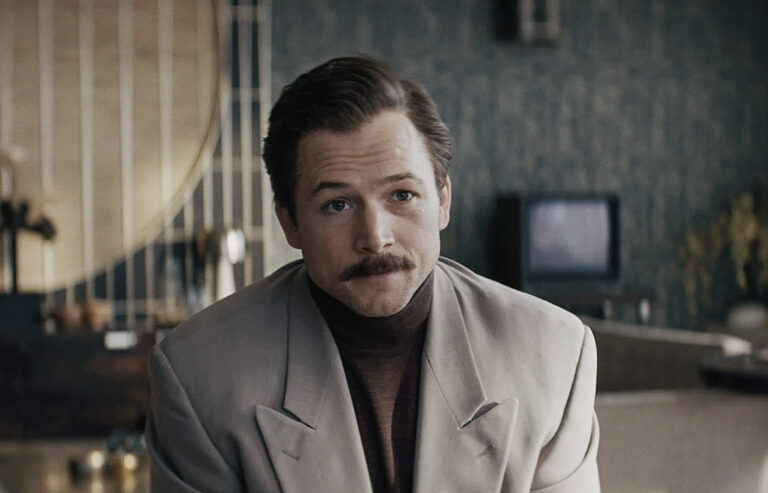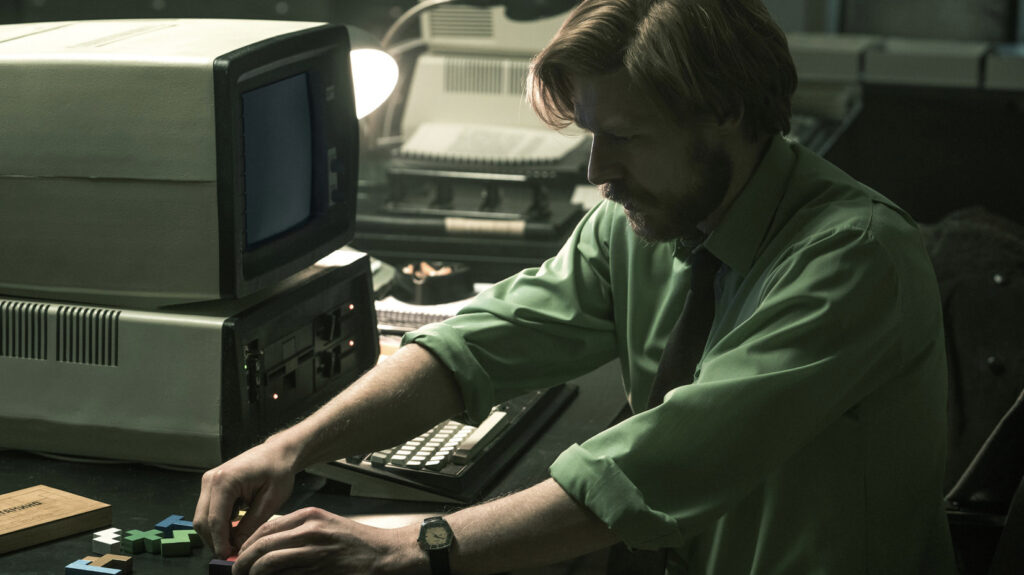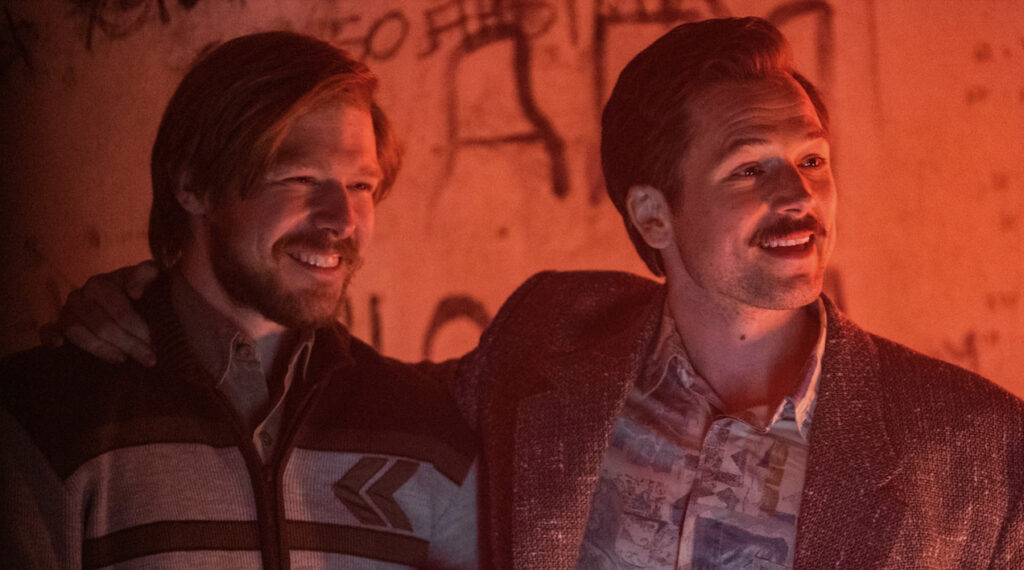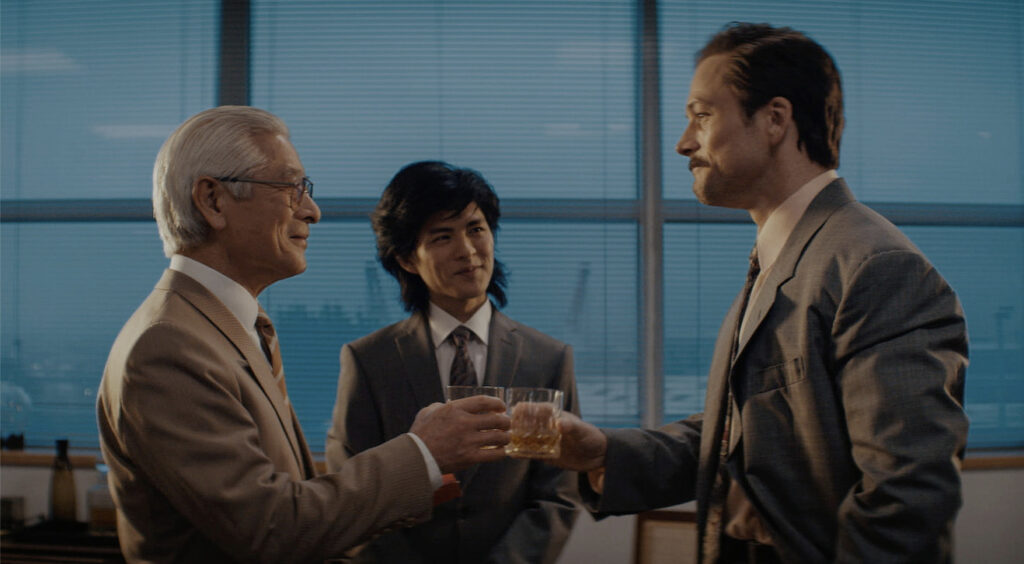
Synopsis : “Tetris” tells the unbelievable story of how one of the world’s most popular video games found its way to avid players around the globe. Henk Rogers (Taron Egerton) discovers TETRIS in 1988, and then risks everything by traveling to the Soviet Union, where he joins forces with inventor Alexey Pazhitnov (Nikita Efremov) to bring the game to the masses. Based on a true story, “Tetris” is a Cold War-era thriller on steroids, with double-crossing villains, unlikely heroes and a nail-biting race to the finish.
Rating: R (Language)
Genre: Mystery & thriller, Biography, Drama
Original Language: English
Director: Jon S. Baird
Producer: Gillian Berrie, Len Blavatnik, Gregor Cameron, Claudia Schiffer, Matthew Vaugn
Writer: Noah Pink
Release Date (Theaters): Mar 24, 2023 Limited
Release Date (Streaming): Mar 31, 2023
Runtime: 1h 58m
Distributor: Apple TV+

Interview with Actor Taron Egerton
Q : When you think about it, there’s so many crazy elements in this story. What was it that really grabbed you when you first read it?
Taron: When Matthew first sent me it, I was keen to dissect what was truth and what was fiction, and what was the Hollywood kind of “Jazz.” Aside from a big set piece at the end of the movie, which is a car chase. That is, the biggest embellishment in a nutshell. But I was amazed to learn a lot of what is featured in the story did actually happen. Particularly, [I liked] my character’s very cavalier attitude — to go into this part of the world to try and procure the rights to a video game, and [deal with] the other interested parties. I just thought it was a story that was well told. I thought the combination of this incredibly recognizable brand and this largely unknown story would make for a good movie. I thought people would be interested in it.
Q: What did you find most interesting about Henk and Alexey as people? What kind of involvement did you have with the both of them throughout the whole process?
Taron: We shot this movie at the end of 2020, when it was still very much “COVID land.” The only interactions I had with Henk were over Zoom a couple of times. I met Alexey later, about a year ago, when we did some reshoots. I met Henk in the flesh then. I suppose the thing that’s most interesting about them is they’re from different worlds with very different ideologies. There’s something charming about how they connected and formed a very strong friendship over something that’s inherently quite childlike. They both become quite childlike around one another. They are still very, very close and still work and spend time together. Being the hopeless, sentimental, romantic that I am, I find that appealing and charming. I really liked that central relationship in the film.
Q: Had you ever imagined that a game as simple as Tetris almost caused an international conflict with the Soviet Union?
Taron: I wasn’t aware of the story before being sent the script. But it kind of makes sense, given the fact that it was obviously something of huge interest to some quite wealthy, noteworthy parties outside of Russia. I suppose, once the regime understood that, you can see why it would potentially be quite incendiary given those separate factions’ different views of the world.
Q: This isn’t your first time that you played a real person. What’s your approach on that? Do you go to the script or to the real person?
Taron: No. If you want to really be brutally honest — the last person you should ask advice from is the person you’re playing. Your eyes should be on what serves the story best. I hope, if your integrity is intact, you’re trying to balance out doing the person [truthfully]. I have no interest in playing someone and then hating the depiction. I also think the danger with asking somebody’s advice is that, potentially, we all wish we could have been a different version of ourselves in the past. It’s very, very hard for somebody — when they know they are being depicted — to resist the temptation to try and rewrite history.
Whilst it’s of interest to me, what somebody might say, in terms of their opinion on how they should be portrayed. I also try to trust my own compass on how they should be portrayed. It’s always in service of the script. I believe you can’t depict anything in a movie that’s not in the writing. You can’t play a subtext that’s not there. I could be filming a scene in a movie whereI’m imagining I’ve just killed somebody, but unless it’s directly dealt with in the text, the audience is never going to know. So, in my opinion, it’s always in service with the script. This one does a good job of dealing with that central relationship and those characters, which is why I decided to do it.

Q: What was the most surprising element about the relationship with Henk and Akemi?
Taron: I don’t know what surprised me about it but I think they were once very in love. Then they had a family and their love came to an end. That’s a story as old as time. I can’t speak to the nature of their relationship now. I really don’t know anything about it. But I don’t know that there’s anything that I found massively surprising. They met when they were very young, fell in love, and lived in several places across the globe. They met in the States and then moved to Japan, I think.
Q: I was curious about particularly like a Bullet-Proof Software when they were working together.
Taron: They obviously had a very intense and a close working relationship, as well as a romantic one. After a point, it just came to an end. But I think they’re still on fairly civil terms, but I don’t really know whether they get on now.
Q: Because Russia has launched an invasion, you carrying a story related to it, so do you carry in so they make you feel a different opinion about a whole story, or maybe not.
Taron: The events of the past two years are horrific, tragic and unfortunate. But I don’t think it makes me feel particularly different about the movie, because the actions of the regime in Russia are not the actions of all Russian people. I don’t think that, for a second, we shouldn’t affectionately depict Russian characters. That kind of binary attitude is one of the biggest problems in the world. Whilst I think any conversations around the establishment in Russia are worthy of sensitive and considered debate, I don’t think it changes my feelings about this movie, because we are 35 years removed.

Q: Henk Rogers is an ambitious businessman focusing on his work. For much of the film we don’t know the story behind the character because it moves so fast. How was the process of understanding this man behind the scenes?
Taron: Yeah, it does move quickly. There are certain projects that I’ve been a part of where the character really is the story. My last project for Apple [Blackbird] is more like that. Whilst it has a great plot, it’s got two central characters and they are what are under the microscope at the end of the day. It’s a story of my character, changing and becoming a different person. Whereas with this movie, Tetris, isn’t really about that. I would say it’s more of a plot-driven movie than it is a character-driven one. Whilst it’s a great character, and one I enjoyed playing, Henk is inevitably the driving force of the movie. I think he particularly changes over the course of the movie, maybe a little bit but his transformation is not the focus of the narrative.
It’s just an extraordinary story that defies belief. It does move quickly, and doesn’t particularly deal with a great deal of who Henk is, outside of this situation. That’s not really the reason I did it. I did it because I thought the story was extraordinary. You could have had a movie that was more analytical about who he is, and what his motives are. But I don’t know if that’s the movie that people want to see. I don’t know that it would have quite the same appeal. He’s not necessarily that well known outside of this very specific situation, if you know what I mean.
Q: You explained that you didn’t think it’s a good idea to consult the person that you’re playing but after you met Henk for the first time, was he what you expected from having read the script. Did anything about him and his life inform your choices in the film?
Taron: It’s not a movie that really deconstructs Henk’s character. He’s fairly constant. He has an aim, a pursuit, he goes after it and succeeds. It’s not really that there’s any large degree of transformation. As I said before, you can’t really do anything with a character that’s not in the script. It’s just not a movie really about Henk. It’s a movie about Tetris. So there’s only so much that I can do to craft the character that isn’t really under the microscope. I tried to make him the best version of what the movie needs him to be — someone that you root for, someone that you like, and someone who is reasonably fallible because he’s a human being. We all are. But it’s not like “Rocket Man,” where the performances are central [to the film]. Am I making sense? But it’s a really great part in service of the plot. Whereas in a movie like “Rocket Man,” the character changing is sort of the plot.
Q: Have you gotten any interesting reactions from people who lived during the Tetris era, or about you being in the film?
Taron: Yeah — that kind of nostalgic, fond recognition of something that’s still very recognizable. But it doesn’t occupy the zeitgeist in the way that it did 30 years ago. That’s what nostalgia is, I suppose — like someone saying, “Oh, wow, I lost three months of my life that came in 1991.” Certainly a lot of people have expressed interest because they got swept up in that movement at the time where everyone was playing it.
Q: Obviously, a really interesting factor in the film is the presence of Robert Maxwell. Do you view him as the villain of the film in some way? What was your knowledge about Maxwell before you started on this?
Taron: I only had very basic knowledge of him being a media tycoon. Did I view him as the villain? He’s certainly depicted as somebody with less than 100% sound morals. But I think everybody in the movie, certainly Stein, the Maxwells, and, to a certain extent, Henk, are all acting out of self-interest. They’re all in pursuit of this treasure. Where it gets a little more nuanced is that Henk, through his burgeoning friendship with Alexey, starts to want to honor him as well as his own needs. Certainly, Belikov is depicted as somebody who is less self-serving and has a more noble intent in that he wants it to be in service of the country he’s from and the country he loves. But, yeah, he’s a villain of sorts by virtue of the fact that Henk’s the hero and his motives are in opposition to him.
Interview with a Creator of Tetris, Alexey Pajitnov and a Game Designer/ Entrepreneur Henk Rogers.

Check out more of Nobuhiro’s articles.
Release Date : March 31st / Netflix.
Here’s the trailer of the film.

